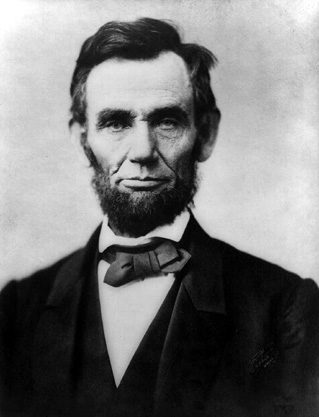Lincoln rose from humble backwoods origins to become
one of the great presidents of the United States. In his effort
to preserve the Union during the Civil War, he assumed more power
than any preceding president. If necessity made him almost a
dictator, by fervent conviction he was always a democrat. A superb
politician, he persuaded the people with reasoned word and thoughtful
deed to look to him for leadership. He had a lasting influence
on American political institutions, most importantly in setting
the precedent of vigorous executive action in time of national
emergency.
Lincoln thought secession illegal, and was willing
to use force to defend Federal law and the Union. When Confederate
batteries fired on Fort Sumter and
forced its surrender, he called on the states for 75,000 volunteers.
Four more slave states joined the Confederacy but four remained
within the Union.
The Civil War had begun.
~ Early Years ~
The son of a Kentucky frontiersman, Lincoln had to
struggle for a living and for learning. Five months before receiving
his party's nomination for President, he sketched his life:
"I was born Feb. 12, 1809, in Hardin County,
Kentucky. My parents were both born in Virginia, of undistinguished
families--second families, perhaps I should say. My mother, who
died in my tenth year, was of a family of the name of Hanks....
My father ... removed from Kentucky to ... Indiana, in my eighth
year.... It was a wild region, with many bears and other wild
animals still in the woods. There I grew up.... Of course when
I came of age I did not know much. Still somehow, I could read,
write, and cipher ... but that was all."
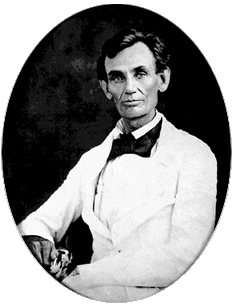
|
Abraham Lincoln's ancestry on his father's side has been traced
to Samuel Lincoln, a weaver who emigrated from Hingham, England,
to Hingham, Massachusetts, in 1637. The president's forebears
were pioneers who moved west with the expanding frontier from
Massachusetts to Berks County, Pennsylvania, and then to Virginia.
Abraham's father, Thomas Lincoln, was born in Rockingham County
in backcountry Virginia in 1778. In 1781 Thomas Lincoln's father,
who was also named Abraham, took his family to Hughes Station
on the Green River, 32 km (20 mi) east of Louisville, Kentucky.
In 1786 an Indian (Native American) killed the first Abraham
Lincoln while he was at work clearing land for a farm in the
forest. |
|
Thomas Lincoln continued to live in Kentucky. He saw
it develop from a frontier wilderness into a rapidly growing
state. But like his ancestors he preferred the rugged life on
the frontier. In a brief autobiography written for a political
campaign, Lincoln said that his father "even in childhood
was a wandering labor boy, and grew up literally without education.
He never did more in the way of writing than to bunglingly sign
his own name."
Despite Thomas Lincoln's apparent shiftlessness, he became a
skilled carpenter, and he never lacked the basic necessities
of life. At one time he owned title to two farms. He always possessed
one or more horses. He paid his taxes, and, like his neighbors,
he accepted jury duty and militia duty when called.
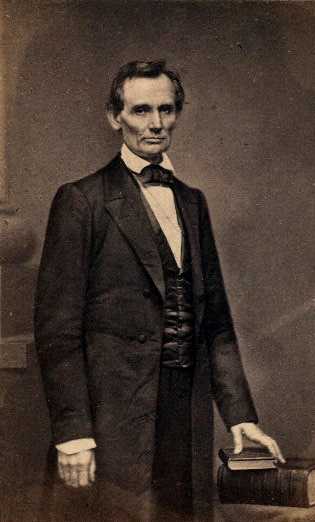
On June 12, 1806, Thomas Lincoln married Nancy Hanks. Little
is known about Abe Lincoln's mother except that she came from
a very poor Virginia family. She was completely illiterate and
signed her name with an X. After their marriage the Lincolns
moved from a farm on Mill Creek in Hardin County, Kentucky, to
nearby Elizabethtown. There Thomas Lincoln earned his living
as a carpenter and handyman. In 1807 a daughter, Sarah, was born.
In December 1808 the Lincolns moved to a 141-hectare (348-acre)
farm on the south fork of Nolin Creek near what is now Hodgenville,
Kentucky. On February 12, 1809, in a log cabin that Thomas Lincoln
had built, a son, Abraham, was born. Later the Lincolns had a
second son who died in infancy.
When Abraham Lincoln was two, the family moved to another farm
on nearby Knob Creek. Life was lonely and hard. There was little
time for play. Most of the day was spent hunting, farming, fishing,
and doing chores. Land titles in Kentucky were confused and often
subject to dispute. Thomas Lincoln lost his title to the Mill
Creek farm, and his claims to both the Nolin Creek and Knob Creek
tracts were challenged in court. In 1816, therefore, the Lincolns
decided to move to Indiana, where the land was surveyed and sold
by the federal government. |
|
In the winter of 1816 the Lincolns took their meager possessions,
ferried across the Ohio River, and settled near Pigeon Creek,
close to what is now Gentryville, Indiana. Because it was winter,
Thomas Lincoln immediately built a crude, three-sided shelter
that served as home until he could build a log cabin. A fire
at the open end of the shelter kept the family warm. At this
time southern Indiana was a heavily forested wilderness. Lincoln
described it as a "wild region, with many bears and other
wild animals in the woods." Later some of Nancy Hanks's
relatives moved near the site the Lincolns had chosen, and a
thriving frontier community gradually developed.
In 1818 an epidemic of the milk sick broke out. This was not
actually a disease. It was caused by drinking poisoned milk from
cows that had eaten the wild snakeroot plant. One of the first
victims of the milk sick was Nancy Hanks Lincoln. She died October
5, 1818. The next year, Thomas Lincoln journeyed to Elizabethtown,
Kentucky, and married Sarah Bush Johnston, a widow with three
children. Abe Lincoln was very much attached to his kind stepmother,
and he later referred to her as "my angel mother."
One of the most important jobs on a frontier farm
was clearing the forest. Young Abe Lincoln quickly became skilled
with an axe. In his autobiographical sketch written in the third
person, Lincoln stated that "the clearing away of surplus
wood was the great task ahead. Abraham, though very young, was
large for his age, and had an axe put in his hands at once. From
that till within his twenty-third year, he was almost constantly
handling that most useful instrument." One of his chores
with an axe was to make fence rails by splitting poles. Later,
as a presidential candidate, Lincoln was known as the "Railsplitter."
~ Education ~
When his father could spare him from chores, Lincoln
attended an ABC school. Such schools were held in log cabins,
and often the teachers were barely more educated than their pupils.
According to Lincoln, "no qualification was ever required
of a teacher beyond readin', writin', and cipherin', to the Rule
of Three." Including a few weeks at a similar school in
Kentucky, Lincoln had less than one full year of formal education
in his entire life.
Abe's stepmother encouraged his quest for knowledge.
At an early age he could read, write, and do simple arithmetic.
Books were scarce on the Indiana frontier, but besides the family
Bible, which Lincoln knew well, he was able to read the classical
authors Aesop, John Bunyan, and Daniel Defoe, as well as William
Grimshaw's History of the United States (1820) and Mason
Locke Weems's Life and Memorable Actions of George Washington
(about 1800). This biography of George Washington made a lasting
impression on Lincoln, and he made the ideals of Washington and
the founding fathers of the United States his own.
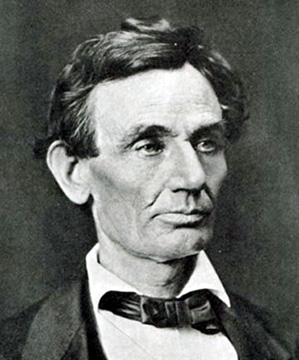
By the time Lincoln was 19 years old, he had reached his full
height of 1.93 m (6 ft 4 in). He was lean and muscular, with
long arms and big hands that gave him an awkward appearance.
Although he had remarkable strength, he never liked farm work.
He preferred instead the easy congeniality that he found at the
general store in nearby Gentryville. A neighbor recalled "Abe
was awful lazy, he would laugh and talk and crack jokes and tell
stories all the time."
The Pigeon Creek farm was near the Ohio River, and Lincoln often
earned money ferrying passengers and baggage to riverboats waiting
in midstream. In 1828, when he was 19, he was hired by the local
merchant, James Gentry, to take a cargo-laden flatboat down the
Mississippi River to New Orleans. |
|
~ Illinois ~
In 1830 another epidemic of milk sick was rumored
to be breaking out in Indiana. Already the Hanks family had moved
west to Illinois, and their enthusiastic letters describing their
new home rekindled the pioneering spirit in Thomas Lincoln. In
March 1830 the Lincoln family set out for the Illinois country.
They settled at the junction of woodland and prairie on the north
bank of the Sangamon River, 16 km (10 mi) west of what is now
Decatur, Illinois. Lincoln helped his father build a log cabin
and fence in 4 hectares (10 acres) to grow corn. Then he hired
out to neighbors, helping them to split rails. That year, Lincoln
attended a political rally and was persuaded to speak on behalf
of a local candidate. It was his first political speech. A witness
recalled that Lincoln "was frightened but got warmed up
and made the best speech of the day."
In 1831 Lincoln made a second trip to New Orleans.
He was hired, along with his stepbrother and a cousin, by Denton
Offutt, a Kentucky trader and speculator, to build a flatboat
and take it down the Mississippi with a load of cargo. The pay
was 50 cents a day plus a fee of $60. According to legend, Lincoln
saw his first slave auction in New Orleans and said, "If
I ever get a chance to hit that thing, I'll hit it hard."
~ Early Political Career
~
In the spring of 1832, Lincoln decided to run for
a seat in the Illinois house of representatives. This was a logical
step for Lincoln to take, for on the frontier a young man with
ability and ambition could rise rapidly in politics.
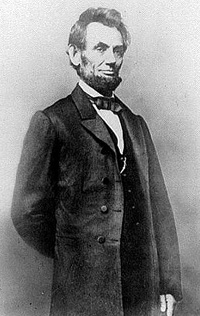
|
A month after Lincoln announced his candidacy, Offutt's general
store went bankrupt and Lincoln found himself without a job.
But almost immediately, Governor John Reynolds of Illinois called
for volunteers to put down a rebellion of the Native American
Sauk (or Sac) and Fox peoples led by Chief Black Hawk. Lincoln
enlisted at once and, because of his popularity, was elected
captain of his company. When his term expired, he reenlisted
as a private. In all, he served three months, but saw no actual
fighting. However, Lincoln took great pride in this brief military
career. |
|
~ First Campaign ~
When Lincoln returned to New Salem in 1832, election
day was two weeks away. It was a presidential election year,
and political parties had formed around the contending candidates.
Followers of Andrew Jackson, who was seeking a second term as
president, called themselves Democrats. Followers of U.S. Senator
Henry Clay of Kentucky called themselves National Republicans
and later Whigs. Lincoln supported Clay, who had long been his
political idol. He remained a faithful Whig until the party disintegrated
over the question of slavery in the 1850s.
Lincoln's program, as published in the Sangamon, Illinois, Journal,
called for the construction of canals and roads, better schools,
and a low interest rate to stimulate local economic growth. In
his brief campaign, Lincoln spoke from tree stumps in village
squares, visited farmers in their homes and fields, and shook
hands and exchanged stories with as many people as he could meet.
Nevertheless, he was defeated. There were 13 county candidates
running for four legislative seats. Lincoln finished eighth.
In his own precinct, however, he got 277 out of 300 votes even
though the precinct voted overwhelmingly to support the Democrat,
Jackson, for the presidency.
~ Postmaster ~
After his defeat, Lincoln opened a general store in
New Salem with William F. Berry as his partner. But Berry misused
the profits, and in a few months the venture failed. Berry died
in 1835, leaving Lincoln responsible for debts amounting to $1100.
It took him several years to pay them off.
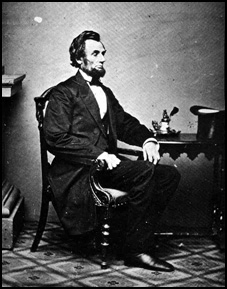
|
After the general store failed, Lincoln was appointed postmaster
of New Salem. The appointment came from Jackson's Democratic
administration. Lincoln's Whig views were well known, but, as
Lincoln explained it, the postmaster's job was "too insignificant
to make his politics an objection." As postmaster, Lincoln
earned $60 a year plus a percentage of the receipts on postage.
He ran an informal post office, often doing favors for friends,
such as undercharging them for mailing letters. The job gave
him time to read, and he made a habit of reading all the newspapers
that came through the office. To augment his income, he became
the deputy surveyor of Sangamon County. |
|
~ Illinois Legislator ~
In 1834 Lincoln again ran for representative to the
Illinois legislature. By then he was known throughout the county,
and many Democrats gave him their votes. He was elected in 1834
and reelected in 1836, 1838, and 1840. As a member of the Whig
minority he became the protégé of the Whig floor
leader, Representative John T. Stuart of Springfield. When Stuart
ran for a seat in the Congress of the United States in 1836,
Lincoln replaced him as floor leader. Stuart also encouraged
Lincoln to study law, which Lincoln did between legislative sessions.
Lincoln's main achievement as a state legislator was the transfer
of the state capital from Vandalia to Springfield. In this effort
he acted as the leader of Sangamon County's delegation of seven
representatives and two state senators, a group called the Long
Nine because they were all tall men. Lincoln devised a strategy
whereby the Sangamon delegation supported the projects of other
legislators in return for their support of Springfield as the
capital city. In American politics this kind of aid is called
logrolling, a term derived from frontier families' tradition
of helping each other to build log cabins.
Lincoln's other votes in the state legislature reflected his
Whig background. He supported the business interests in the state
and defended the pro-business national platform of Henry Clay.
Lincoln's experience in the Illinois legislature sharpened his
political skills. He was adept at logrolling, skilled in debate,
and expert in the art of political maneuver.
In 1837 Lincoln took his first public stand on slavery when the
Illinois legislature voted to condemn the activities of the abolition
societies that wanted an immediate end to slavery by any means.
Lincoln and a colleague declared that slavery was "founded
on both injustice and bad politics, but the promulgation of abolitionist
doctrine tends rather to increase than abate its evil."
Lincoln was against slavery, but he favored lawful means of achieving
its destruction. Throughout his political career, Lincoln avoided
extreme abolitionist groups.
~ Early Law Practice ~
Meanwhile, Lincoln continued his study of law, and in 1836 he
became a licensed attorney. The following year he became a junior
partner in John T. Stuart's law firm and moved from New Salem
to Springfield. Lincoln was extremely poor and arrived in Springfield
on a borrowed horse with all his belongings in two saddlebags.
A Springfield storekeeper, Joshua Fry Speed, whom Lincoln later
called "my most intimate friend," gave Lincoln free
lodging.
~ Courtship and Marriage
~
According to a now discredited legend, while in New
Salem, Lincoln was said to have been in love with Ann Rutledge,
the beautiful young daughter of a local innkeeper. When she died
in 1835, Lincoln was said to be "plunged in despair."
The frequent lapses into melancholy that marked his adult years
were said to be a result of this tragic death. But Lincoln in
his later years never referred to Ann Rutledge, and authorities
are unanimous in agreeing that the Lincoln-Rutledge romance is
a myth.
Indeed, less than 18 months after Ann's death, Lincoln proposed
marriage to Mary Owens, a Kentucky girl who also lived in New
Salem. Theirs was not an ardent love affair, but having made
his proposal, Lincoln felt he could not honorably break it off.
Much to his relief, Mary turned him down. Later she explained,
"I thought Mr. Lincoln was deficient in those little links
which make up the chain of a woman's happiness."

|
In 1840, Lincoln met a cultured, high-strung Kentucky woman
named Mary Todd (right), who was
staying with a married sister in Springfield. After a long courtship,
they were married on November 4, 1842. A week later, Lincoln
wrote a fellow lawyer, "Nothing new here, except my marrying,
which to me, is a matter of profound wonder." |
|

|
Late in 1843 the Lincolns moved from their simple rented
quarters to a modest frame house in Springfield that Lincoln
bought for $1500. Of their four boys, only the eldest, Robert
Todd Lincoln (right), reached adulthood.
He was born in 1843 and died in 1926. Edward Baker Lincoln was
born in 1846 and died at the age of four. |
|
 
|
William Wallace (right),
called Willie, was born in 1850 and died in the White House,
the presidential mansion, shortly before his 12th birthday. Lincoln's
favorite son, Thomas, whom he affectionately called Tad (left), was born in 1853, grew up in
the White House, and died at the age of 18. |
|

|
In contrast with the sweet, loving Ann Rutledge of legend, Mary
Todd Lincoln has unfairly been pictured as a shrew who made Lincoln's
life miserable. Certainly she was spoiled, haughty, and temperamental.
The death of her children caused her much anguish, and after
Willie's death she was often hysterical. Lincoln was devoted
to her, however, and there is no evidence that theirs was not
a happy marriage. |
|
On those occasions when she became upset, Lincoln
treated her with patience and understanding. He, for his part,
was careless in his personal habits and subject to extreme depression.
What he and his wife had in common was ambition. Mary aided her
husband's political career immeasurably.
~ Frontier Lawyer ~
At the time of his marriage, Lincoln was earning $1200
to $1500 a year from his law practice, a good income for the
time and place. When the law firm of Stuart and Lincoln dissolved
in 1841, Stephen T. Logan, an able and experienced lawyer, took
Lincoln in as junior partner. In 1844 the firm of Logan and Lincoln
also dissolved, and Lincoln formed a lifelong partnership with
a young lawyer named William H. Herndon.
Lawsuits on the Illinois frontier usually dealt with such trivial
matters as crop damage caused by wandering livestock, ownership
of hogs and horses, small debts, libel, and assault and battery.
The Springfield courts were in session only a small part of the
year. For three months each spring and fall, lawyers and judges
rode the circuit, holding court at rural county seats. Lincoln
rode the eighth judicial circuit, the largest in the state, covering
15 counties and about 12,900 sq km (about 8000 sq mi).
The local sessions of the circuit court were major events on
the frontier. The particulars of each case were well known to
the townspeople and were subject to heated debate. Courtroom
conduct was informal, and more often than not a case was won
on a lawyer's speaking ability rather than the legal merits of
his case. The judge and the lawyers were treated as celebrities,
and Lincoln, because of his storytelling abilities and skill
as a lawyer, was popular on the circuit. Ever the politician,
he used this opportunity to meet new people and advance his political
career.
Lincoln still had political ambitions, but he now looked beyond
the statehouse to the U.S. Congress. In 1843 he wrote a fellow
politician, "Now if you should hear any one say that Lincoln
don't want to go to Congress, I wish you as a personal friend
of mine, would tell him you have reason to believe he is mistaken.
The truth is, I would like to go very much."
The Whigs were a minority party in Illinois, and there was competition
among the Whig politicians over the nomination for U.S. representative
for the Seventh Congressional District, where Whigs were in the
majority. Lincoln sought the nomination in 1842 and 1844 and
received it in 1846. He went on to defeat the Democratic candidate,
the Methodist preacher Peter Cartwright, in the election of November
1846.
~ United States Congressman
~
Congressman-elect Lincoln was a popular, masterful
politician in Illinois. Having succeeded in the rough-hewn Illinois
legislature, he was confident that he would make his mark in
Congress. Once in Washington, D.C., however, Lincoln became one
of many unknown freshman congressmen. The inner councils of government
were closed to him, as was the Washington social life that Mary
Lincoln was looking forward to. However, Lincoln never lost confidence
in himself. He wrote Herndon, "As you are all so anxious
for me to distinguish myself, I have concluded to do so before
long." The Lincolns, with their two sons, lived quietly
in a modest boardinghouse. Lincoln had a small body of friends
with whom he could relax and discuss politics. Among them was
Alexander H. Stephens, the Whig congressman from Georgia, who
later became vice president of the Confederate States of America.
~ Antislavery Leader ~
Lincoln was losing interest in politics when, in 1854,
Congress passed the Kansas-Nebraska Act. The act aroused Lincoln,
in his words, "as he had never been before." The act
created the territories of Kansas and Nebraska, and stated that
each territory could be admitted as a state "with or without
slavery, as their constitution may prescribe at the time of their
admission." The author of the act, Senator Stephen A. Douglas,
the leading Democrat of Illinois, called this program popular
sovereignty because it allowed the voters in these territories
to decide for themselves whether slavery would be allowed. The
Kansas-Nebraska Act repealed the old dividing line between free
and slave states as set by the Missouri Compromise of 1820.
With the passage of the Kansas-Nebraska Act, a new Lincoln emerged
into the world of politics. Although he was as ambitious for
political office as ever, he was now, for the first time in his
career, devoted to a cause. He became a forceful spokesman for
the antislavery forces.
~ Candidate for United States
Senate ~
Agitation over the slavery issue increased in 1856
and 1857. In the Dred Scott Case the U.S. Supreme Court ruled
that Congress could not prohibit slavery in the territories.
In Kansas proslavery and antislavery partisans were engaged in
a bloody civil war for control of the territorial government.
Northern abolitionists demanded the immediate destruction of
slavery, while Southern apologists insisted that their "peculiar
institution" was beneficial to both slaveowner and slave.
In 1858 Senator Douglas came up for reelection. The Republican
Party nominated Lincoln to oppose him. In his acceptance speech
before the Republican state convention in Springfield, Lincoln
said, "A house divided against itself cannot stand. I believe
this government cannot endure permanently half slave and half
free. I do not expect the Union to be dissolved; I do not expect
the house to fall; but I do expect it will cease to be divided.
It will become all one thing, or all the other." This was
Lincoln's most extreme statement against slavery. Although he
returned to his more moderate position as expressed in the Peoria
speech, his opponents used the militant words of the House Divided
speech against him.
~ Lincoln-Douglas Debates
~
Both Lincoln and Douglas were excellent speakers.
When Douglas was told that Lincoln was his opponent, he said,
"I shall have my hands full. He is the strong man of the
party-full of wit, facts, dates-and the best stump speaker, with
his droll ways and dry jokes, in the West."
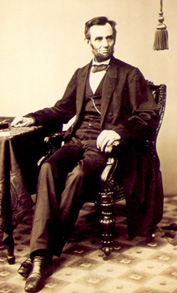
|
The campaign opened in Chicago. Douglas defended popular sovereignty
and attacked Lincoln for his "house divided" speech.
He accused Lincoln of trying to divide the nation. Lincoln replied
by calling for national unity. Recalling the Declaration of Independence,
the document on which the United States was founded, he said,
"Let us discard all this quibbling about this man and the
other man-this race and that race and the other race, being inferior,
and therefore they must be placed in an inferior position. Let
us discard all these things, and unite as one people throughout
the land, until we shall once more stand up declaring that all
men are created equal." |
|
In July, Lincoln challenged Douglas to a series of face-to-face
debates. Douglas accepted. It was arranged that seven three-hour
debates would be held in seven different cities between August
and October. In the debates, both candidates respected each other
and kept to the issues. The crux of the discussion was the morality
of slavery.
The debates captivated Illinois. About 10,000 people listened
to the first debate under a blazing hot sun at Ottawa. Over 15,000
listened in drizzling rain at Freeport. Even in the small towns
where the candidates spoke alone, crowds of as many as 6000 were
common. The newspapers carried the arguments of each candidate
throughout the nation.
The Lincoln-Douglas debates brought Lincoln national recognition.
He accepted invitations to speak in Ohio, Indiana, Kansas, Iowa,
Wisconsin, and at the Cooper Union college in New York City.
~ PRESIDENT OF THE UNITED
STATES ~
First Year in Office
Even before election day, Southern militants were
threatening to secede from the Union if Lincoln was elected.
In December, with the Republican victory final, South Carolina
seceded. By February, Mississippi, Florida, Alabama, Georgia,
Louisiana, and Texas had followed. These states joined together
to form the Confederate States of America,
also known as the Confederacy. President
Buchanan did nothing to stop the secessionist movement, and
President-elect Lincoln was not yet in a position to intercede.
Lincoln remained silent on the issue, believing that, in time,
Union sentiment would reassert itself in the South and the secession
of the seven states would come to an end.
On February 11, 1861, Lincoln bade farewell to his neighbors
in Springfield and set out for Washington, D.C. He now had a
beard, which he had grown at the suggestion of a young girl during
the campaign. Alluding to the troubled days ahead, he told his
friends, "Today I leave you; I go to assume a task more
difficult than that which devolved upon General Washington. Unless
the great God who assisted him, shall be with and aid me, I must
fail. But if the same omniscient mind, and almighty arm that
directed and protected him, shall guide and support me, I shall
not fail, I shall succeed. Let us all pray that the God of our
fathers may not forsake us now."
On the way to Washington, Lincoln made many short speeches, but
he did not commit himself to a specific policy regarding the
South. Because of a rumor of an assassination plot against him
in Baltimore, he was secretly spirited through that city and
into Washington by night. The opposition press ridiculed this
undignified entry of the president-elect into the capital.
~ The Civil War ~
As a commander in chief Lincoln was soon noted for
vigorous measures, sometimes at odds with the Constitution and
often at odds with the ideas of his military commanders. After
a period of initial support and enthusiasm for George
B. McClellan, Lincoln's conflicts with that Democratic general
helped to turn the latter into his presidential rival in 1864.
Famed for his clemency for court-martialed soldiers, Lincoln
nevertheless took a realistic view of war as best prosecuted
by killing the enemy. Above all, he always sought a general,
no matter what his politics, who would fight. He found such a
general in Ulysses S. Grant, to whom he gave overall command
in 1864. Thereafter, Lincoln took a less direct role in military
planning, but his interest never wavered, and he died with a
copy of Gen. William Sherman's orders for the March to the Sea
in his pocket.
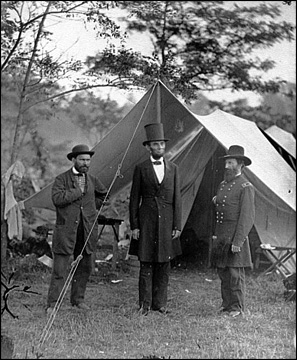
|
Politics vied with war as Lincoln's major preoccupation in the
presidency. The war required the deployment of huge numbers of
men and quantities of materiel; for administrative assistance,
therefore, Lincoln turned to the only large organization available
for his use, the Republican party. With some rare but important
exceptions (for example, Secretary of War Edwin M. Stanton),
Republicans received the bulk of the civilian appointments from
the cabinet to the local post offices. Lincoln tried throughout
the war to keep the Republican party together and never consistently
favored one faction in the party over another. Military appointments
were divided between Republicans and Democrats. |
|
Democrats accused Lincoln of being a tyrant because he proscribed
civil liberties. For example, he suspended the writ of habeas
corpus in some areas as early as Apr. 27, 1861, and throughout
the nation on Sept. 24, 1862, and the administration made over
13,000 arbitrary arrests. On the other hand, Lincoln tolerated
virulent criticism from the press and politicians, often restrained
his commanders from overzealous arrests, and showed no real tendencies
toward becoming a dictator. There was never a hint that Lincoln
might postpone the election of 1864, although he feared in August
of that year that he would surely lose to McClellan. Democrats
exaggerated Lincoln's suppression of civil liberties, in part
because wartime prosperity robbed them of economic issues and
in part because Lincoln handled the slavery issue so skillfully.
The Constitution protected slavery
in peace, but in war, Lincoln came to believe, the commander
in chief could abolish slavery as a military necessity. The preliminary
Emancipation Proclamation of Sept. 22, 1862, bore this military
justification, as did all of Lincoln's racial measures, including
especially his decision in the final proclamation of Jan. 1,
1863, to accept blacks in the army. By 1864, Democrats and Republicans
differed clearly in their platforms on the race issue: Lincoln's
endorsed the 13th Amendment to the Constitution abolishing slavery,
whereas McClellan's pledged to return to the South the rights
it had had in 1860.

|
Lincoln's victory in that election thus changed the racial
future of the United States. It also agitated Southern-sympathizer
and Negrophobe John Wilkes Booth , who
began to conspire first to abduct Lincoln and later to kill him.
On Apr. 14, 1865, five days after Robert E. Lee's surrender to
Grant at Appomattox Court House, Lincoln attended a performance
of Our American Cousin at Ford's Theatre in Washington.
There Booth entered the presidential box and shot Lincoln.
The next morning at 7:22 Lincoln died
President's box seats at Ford's
Theater (left) |
|
Lincoln never let the world forget that the Civil
War involved an even larger issue. This he stated most movingly
in dedicating the military cemetery at Gettysburg: "that
we here highly resolve that these dead shall not have died in
vain--that this nation, under God, shall have a new birth of
freedom--and that government of the people, by the people, for
the people, shall not perish from the earth."
Click here to go to Lincoln's "Gettysburg
Address"
Lincoln won re-election in 1864, as Union military
triumphs heralded an end to the war. In his planning for peace,
the President was flexible and generous, encouraging Southerners
to lay down their arms and join speedily in reunion.
The spirit that guided him was clearly that of his
Second Inaugural Address, now inscribed on one wall of the Lincoln
Memorial in Washington, D. C.: "With malice toward none;
with charity for all; with firmness in the right, as God gives
us to see the right, let us strive on to finish the work we are
in; to bind up the nation's wounds.... "
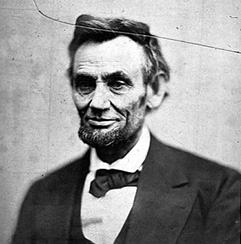
Of all the American presidents, Lincoln is probably the one about
whom the most has been written.
Many critical evaluations of his life have been published, but
they have not diminished his stature, and he remains one of the
foremost products of American democracy and an eloquent spokesman
for its ideals. |
|
|
![]()
